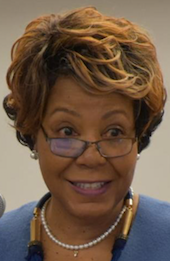A Dentist and AME Elder Faces Cancer and Chemo in the Era of COVID
"To attain survivor status, you must first survive the treatment protocols."
By Letitia Williams Watford

I am a stage 3 cancer survivor. Although I am presently on my third of six rounds of chemotherapy, and still have radiation and two surgeries over nine months on my horizon, I am a survivor. I believe the report of the Lord. This sickness is not unto death. The Lord will fight this battle. I am duty-bound to soldier on. Therefore, I am a survivor. Psalm 118:17 is my prayer mantra. I will not wait until the battle is over, I will shout now.
I actually have more than one type of cancer with one being very aggressive. My oncologist is throwing everything in his arsenal of protocols at this disease. I receive six intravenous medications per six-hour chemo session along with several oral medications that are taken post-infusions.
The major drawback of aggressive cancer is that it calls for aggressive treatment. I cannot exaggerate the dire effect that this regimen has on my mind, body, and soul nor will I bore you with the details. Suffice it to say that I understand and thoroughly empathize with the brave souls who’ve journeyed this way before me but opted for palliative care over treatment. To attain survivor status, you must first survive the treatment protocols. It is daunting. Nevertheless, I remain encouraged because God’s got this. There is life on the other side of this challenge.
My chemotherapy is every 21 days. So, the day my initial session was set, I whipped out my calendar. Yay! It appeared I would not have to miss a single presiding elder, Episcopal, or Connectional Meeting, including General Conference. Ironically, as I was becoming aware of my diagnosis, COVID-19 had been released in the global atmosphere. Then, in the immediate days thereafter, this novel coronavirus raised its ugly head in America, and people—especially people of color—started “dropping like flies.”
Shelter-in-place, social distancing, nightly curfews, and suspension of non-essential services and procedures went into effect. This barred career fields such as dentistry plus curtailed in-person AME gatherings, both of which benefited my good. These “necessary evils” impose themselves on me, allowing me to “slow my roll” and focus on my health and healing. However, that’s not so surprising when “all things work together for good!”
I am a transactional. I get things done. I go and do. I am fully engaged. That’s my love language. With cancer, chemo, and COVID-19, I am not going. I am not getting so much done. I am not driving hither, dither, and yonder across my presiding elder district. I conduct church business by way of varied interactive technologies. My pastors and congregations are very supportive. They’ve pledged to hold the line tightly. My energy is being conserved for life-extending self-care.
I am a bi-vocational transactional. COVID-19 guidelines permit me to see emergency dental patients by appointment only. I presently see these patients over a single four-hour block of time, once or twice each week. In a season when so many dentists of color have gotten so little, even nothing, from the CARES Act, God blessed me to receive both a stimulus grant and a payment protection plan loan. My entire staff has been retained. Compound that with the fact that COVID-19 has not interrupted my cancer therapy as it has for so many others. My gratitude is immeasurable and rightly so.
Rest assured, as a self-described transactional, contemplation is not my strongest suit. However, the confluence of cancer, chemo, and COVID-19 has proven formulaic for raising up the contemplative in me. I’ve always had a prayer, study, and corporate worship life; but as a busy, busy, busy transactional, my “be still and know that I am God” life was lacking. Yet, I am presently called to that very thing: contemplation, which looks like sitting at our family piano and teaching myself to play some of the greatest hymns ever written.
I immerse myself in the lyrics and tunes of “Breathe on me Breath of God,” “Be Still My Soul,” and “Am I a Soldier of the Cross.” These scripturally-based lyrics virtually jump off the page, wafting in, around, and through my spirit. My soul is nourished, my resolve is fortified, and I am uplifted. I am better enabled to cope at the epicenter of the confluence of cancer, chemo, and COVID-19.
I thank God for providing all that is needed. I thank God for bringing me to, through, and out. I lean into my status as a Survivor. I declare and decree I aim to do more than survive but thrive in the days ahead. As I continually pray God’s provision for us all in these universally trying times, I also pray you will find encouragement in my testimony.
The Rev. Dr. Letitia Williams Watford is the Presiding Elder of the Tuskegee District, Ninth Episcopal District, where Bishop Harry L. Seawright is the presiding prelate. She is the first vice president of the Ninth District AME WIM. She practices dentistry in Union Springs (Bullock County), Alabama.


